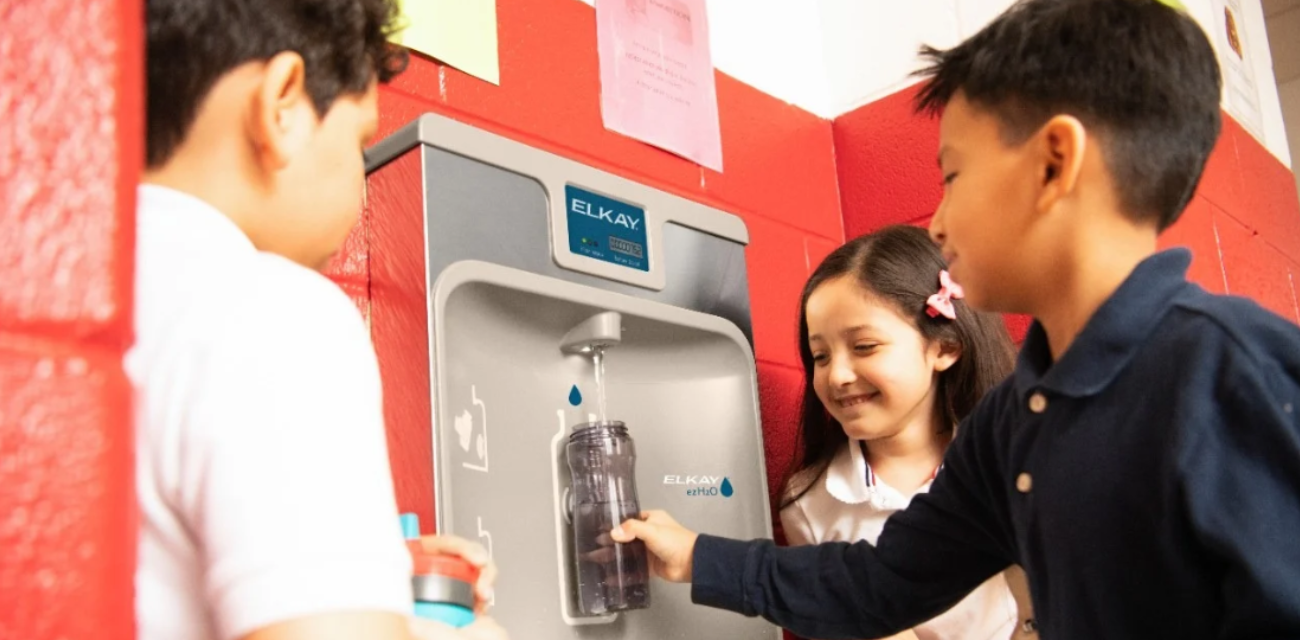The Ecology Center turns a local scare into statewide change

Update: This article was originally published in January 2023. It was updated in September.

This story is part of the Michigan Environmental Council’s 2022 member magazine, “ECOsystems: Working Wonders With Water.” You can read the magazine in full here.
The Ecology Center knows lead poisoning well. For 50 years, the Environmental Council member group has connected the dots between our health and our environment by eliminating dangerous substances that infiltrate our daily lives.
But the work became worryingly personal for Rebecca Meuninck, its former deputy director, when lead was found in the drinking water of Ann Arbor School District. Her son went there.
After that, Meuninck and the Ecology Center became key leaders in the effort to eliminate the threat of lead in school drinking water in Ann Arbor and across the state.
The effort has been dubbed “Filter First,” and a coalition of 40 groups and individuals is driving it. Since 2019, it’s sought to get filtered drinking water stations installed in every school and childcare center in Michigan, virtually eliminating lead’s threat.
Thanks in part to Meuninck and the coalition, some $50 million of the state’s budget has been earmarked for the cause, and widely bipartisan legislation that would activate those funds is poised to pass in the coming days. If the bills become law, they could set the rest of the nation in motion.
 “I’m hopeful that we can get it pushed through in Michigan, and we’re certainly going to share it with our friends in Ohio and other places throughout the Great Lakes,” Meuninck said. “We want to make sure kids all over the country are protected.”
“I’m hopeful that we can get it pushed through in Michigan, and we’re certainly going to share it with our friends in Ohio and other places throughout the Great Lakes,” Meuninck said. “We want to make sure kids all over the country are protected.”
FROM CRISIS TO ACTION
Filter First and its formula for success arguably stems from Ecology Center’s expertise and the lead poisoning dilemma Meuninck faced.
It was the wake of the Flint Water Crisis. School districts like Ann Arbor’s began to test their water for lead and found high levels of it in many of their buildings. This was scary news for the school district’s 17,000 students.
Lead poisoning lowers IQ and raises hyperactivity, making it difficult for children to learn in school and find financial success as adults. Lead also reduces impulse control, leaving those suffering prone to delinquency. And lead’s effects can surface far later in life, like through Parkinson’s disease and osteoporosis.
 In effect, the schools meant to set children up for success were simultaneously, unknowingly hindering them. And Ann Arbor was not alone. Of the 114 Michigan schools and childcare facilities that voluntarily submitted water testing data to the state, 71% had lead levels above the legal filtered limit. No amount is safe.
In effect, the schools meant to set children up for success were simultaneously, unknowingly hindering them. And Ann Arbor was not alone. Of the 114 Michigan schools and childcare facilities that voluntarily submitted water testing data to the state, 71% had lead levels above the legal filtered limit. No amount is safe.
Ann Arbor School District officials and concerned parents like Meuninck acted. They utilized a sinking fund and donations to test pipes for lead and fix those that had the toxic metal. But the nature of schools meant lead kept coming back, said Meuninck.
At home, water always circulates. We brush our teeth, drink water, and flush toilets. At schools, there are always breaks in circulation—on the weekends, over holidays, through the summer. During those breaks, water sits stagnant, wearing off chemicals that keep lead at bay.
 Compounding the issue was the average age of most Ann Arbor schools: 65 years. That’s well before lead was banned in most products. The same scenario plays out in hundreds of districts across Michigan: old schools, bad water circulation.
Compounding the issue was the average age of most Ann Arbor schools: 65 years. That’s well before lead was banned in most products. The same scenario plays out in hundreds of districts across Michigan: old schools, bad water circulation.
So, with parents like Meuninck assisting, the school district pivoted and installed lead filters on drinking water stations. These took much less money and time to install and maintain, and they were just as effective at eliminating lead. The district also kept the installation, maintenance, and test results of water transparent to the public.
The results were immediate. Lead levels dropped to nonexistence, and time will soon show the positive impact that has had on students’ grades, behavior, and energy.
SHARING THE WEALTH
 Still, the work was daunting and difficult, said school board member Rebecca Lazarus, and that was with community wealth and a sinking fund most other lead-poisoned districts weren’t privy to.
Still, the work was daunting and difficult, said school board member Rebecca Lazarus, and that was with community wealth and a sinking fund most other lead-poisoned districts weren’t privy to.
Enter Filter First. As filters were installed in Ann Arbor, Meuninck and the Ecology Center started talks with other nonprofits to create a statewide policy for filter installation and maintenance.
The resulting coalition, funding, and legislation has Ann Arbor School District’s solution and lessons at its core. Filter First policy focuses on effective, efficient lead filters rather than time-consuming, ineffective pipe replacements. It makes sure schools are given funds and guidance for lead filter installations. And it puts parents at ease with transparent lead testing and filter maintenance.
The coalition itself is also reminiscent of the parent-school district-community effort Meuninck was part of in Ann Arbor.
“No one organization can do super well all on [its] own,” she said. “We all bring different skills and strengths and connections.”
The Ecology Center provided lead expertise. School board member Lazarus brought in school concerns and nuances. NRDC created model legislation, and the Environmental Council brought its Capitol knowledge.
Learn more about Environmental Council membership here.
If the actions of the Ecology Center, Meuninck, and Ann Arbor are any testament, lead-free drinking water will soon be in every school and childcare center.
“This is not a bipartisan issue,” Lazarus said. “This is a safety and health issue for all of our students and generations to come in the state of Michigan.”
Legislators are understanding the truth Lazarus speaks. Bills introduced by five lawmakers—four Democrats and one Republican—would install water filters in all school districts and childcare centers across the state. Some of the bills cleared the Senate by a 3-1 margin, and the other bills are expected to follow.
If the bills become law, almost all of Michigan’s 1.5 million children would be protected from lead at the places they learn and are watched over. Some $50 million set aside in last year’s Republican-led budget would also be unlocked to fund the installation of these filters across the state.
It’s something Meuninck, Lazarus, and others have fought five years for in the Filter First coalition. When paired with universal lead testing it would be what Ellen Vial, Detroit program director for the Environmental Council, calls “truly transformational change” in the fight to end lead poisoning.
The Ecology Center is one of nine member groups working with the Environmental Council in the Filter First coalition. To learn more or get involved, visit environmental-council.org/filter_first. To learn more about Environmental Council membership, visit environmentalcouncil.org/members.
Story by Logan Sander and Beau Brockett
Discover
Power environmental change today.
Your gift to the Michigan Environmental Council is a powerful investment in the air we breathe, our water and the places we love.
Sign up for environmental news & stories.
"*" indicates required fields





